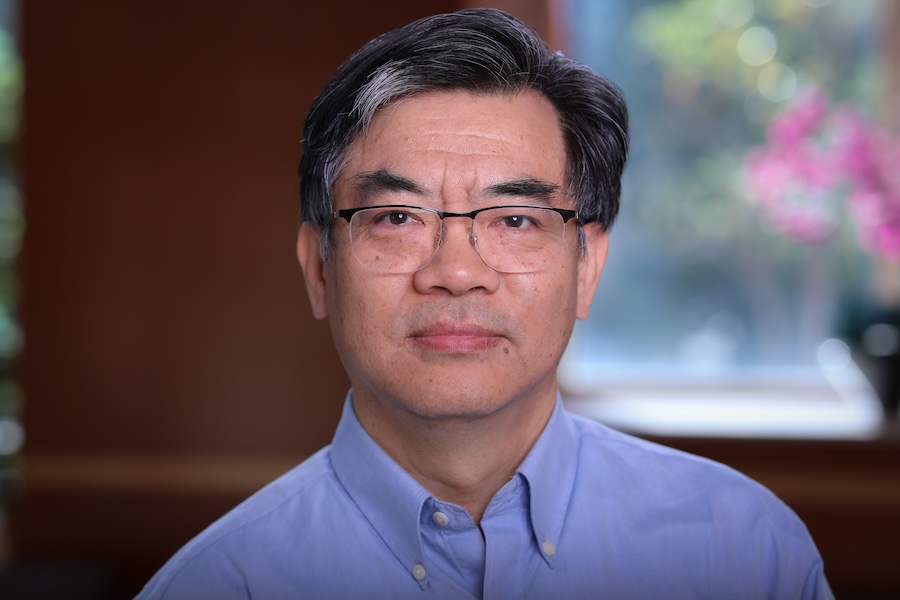Faculty Spotlight: Banghao Chen

Banghao Chen is the director of the Florida State University Nuclear Magnetic Resonance, NMR, facilities within the Department of Chemistry and Biochemistry. He is also a chemistry and biochemistry senior research associate, and he uses NMR in his research to analyze molecular structures and chemical compositions. Chen earned his doctorate in chemistry in 2007 from Western University in London, Ontario, Canada. After graduating, Chen pursued postdoctoral research at Dalhousie University in Halifax, Nova Scotia, Canada, until 2010 when he became a research associate at Oak Ridge National Laboratory in Tennessee. In 2011, Chen moved to Tallahassee to direct the FSU-NMR Facilities. He was awarded FSU’s Distinguished University Scholar Award in 2024 in recognition of his long-standing track record of research and/or creative activity.
Tell us a little about your background, where you’re from and what brought you to FSU.
During my doctoral studies, I began researching porous materials through nuclear magnetic resonance, a technique to analyze the short-range scale structure of molecular samples. I continued my research as a postdoctoral fellow at Dalhousie University and analyzed a wider range of materials with NMR. Afterward, I moved to ORNL and focused on professional preparation in NMR facility management. FSU’s outstanding reputation and opportunities for research collaboration at the National High Magnetic Field Laboratory drove my decision to move.
Can you break down your areas of research for us?
I have broad research interests in NMR methodologies, applications and instrumentation. Recently, my work has focused on NMR facility management, user training, education, probe repair and promoting effective use of NMR in applicable fields like chemistry, materials sciences and medicine development.
What inspired you to choose your field of study?
NMR spectroscopy, a method used to analyze atomic nuclei in a magnetic field, stood out to me because it’s a powerful field that aligns perfectly with my research approach: making clear plans and thorough preparations. NMR provides in-depth, atomic-level insights into the earliest stage of a reaction or growth in molecular structures — typically on the scale of angstroms, a unit of length equal to one hundred-millionth of a centimeter. Deepening our understanding of molecular structures and interactions has immense potential to drive future scientific discoveries and innovation across various fields, such as environmental monitoring that detects contaminants in environmental samples using spectrometers and the field of medicine through magnetic resonance imaging — MRI.
Tell us about earning a FSU Distinguished University Scholar Award.
This recognition was a tremendous honor and signifies my dedication to leadership, scholarly achievements and research efforts. I’m inspired to continue contributing to the FSU research community and to view every moment as an opportunity to create impactful research.
What makes you passionate about researching applications of NMR spectroscopy?
I’m passionate about the applications of NMR spectroscopy because it’s a powerful, non-destructive technique offering unparalleled insight into molecular dynamics, their different interactions and structures at the atomic level. NMR plays a vital role in many fields, including nanotechnology and environmental science. The breadth of its applications continually inspires me to explore new ways NMR can contribute to solving real-world problems in medical diagnostics and material characterization.
Tell us about your position as director of FSU’s NMR facilities.
This position connects my technical mastery with my scientific curiosity. Managing the facilities allows me to enable discoveries by others while deepening my own expertise in developing and managing NMR instruments. Ensuring instruments run reliably and helping users obtain high-quality data is very satisfying.
Additionally, during my professional development leave, I exchanged experiences and strategies with experts at several major NMR facilities. This experience directly benefits research initiatives at FSU, especially in growing areas like the biomolecular NMR of proteins, which analyzes organic compounds found in living creatures to gather insight on protein interactions within biological systems.
What do you want the public to know about the importance of your research?
NMR technology analyzes valuable or complex samples in a magnetic field without destroying the sample. This makes NMR the primary technique used to understand molecular interactions, such as the various ways drug molecules attach to protein binding sites, by analyzing changes in NMR signals.
What’s your favorite part of your job?
My favorite task is using innovative tools to conduct research, support the research of others and collaborate with peers. I also enjoy enhancing the capabilities of the FSU-NMR Facilities by implementing advanced techniques alongside advising experiment design and data interpretation.
Who are your role models?
Above all, my parents are my greatest role models. They believed education could change lives and worked tirelessly to give me educational opportunities they never had. My high school chemistry teacher also made the subject engaging and relevant, inspiring me to explore science further. Now, I aim to do the same for my students.
I was also deeply influenced by the late Jinshan Wang, Ph.D., an expert in NMR I met as a student, who devoted his career to NMR probe development and generously helped the NMR community. His guidance and generosity motivated me to give back to the NMR community by sponsoring young scholars and assisting institutions with limited resources.
Do you have any exciting upcoming projects or goals you’re working toward?
Recently, several low-field instruments in the facility, ranging from 15 to 30-plus years in age became inactive. I was able to secure several magnetic instrument donations from my professional network and the broader NMR community. With additional support from the university, we successfully assembled two additional, fully functional high-resolution NMR spectrometers. This initiative allowed FSU to avoid almost $1 million in potential equipment costs.
I’m also interested in biotechnology, which uses biological systems and organisms to create useful products like medicines and relies on biomolecular NMR spectroscopy to clarify protein structures and interactions. Biotechnology is among the cutting-edge research areas FSU is strategically enhancing and supporting, so now is the time to prepare proposals, site plans, and operational protocols for the future expansion and sustainability of the NMR facilities.
